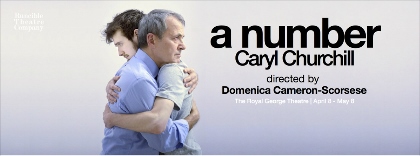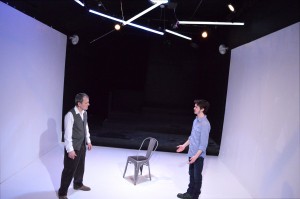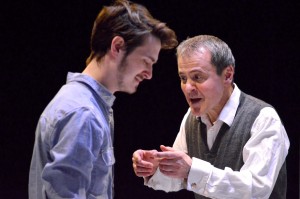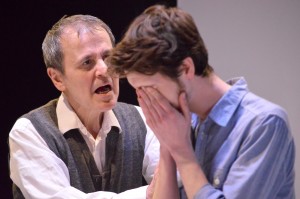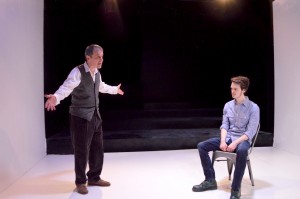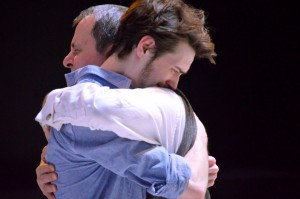CAN A CLONE HAVE AN IDENTITY CRISIS?
We share 99% of our genetic material with every other human, 90% with each chimpanzee, and 30% with any bunch of lettuce. (Talk about “six degrees of separation.”) Now playing the Royal George Gallery Theatre, Caryl Churchill’s two-person drama A Number wonders whether that’s too close for comfort. How much apartness does a “soul” require? Churchill’s terse and troubling one-act confronts the challenges of cloning — both for the “replacement” humanoid and for the source of his duplicated genetic code.
Extrapolating from the original feat of reproducing Dolly the Sheep as a stem-cell “second coming,” the author of Cloud Nine, Owners and Top Girls imagines several seminal (pun not intended) encounters between a middle-aged duffer and three of his “children.” Superbly shaped by director Domenica Cameron-Scorsese for Runcible Theatre Company, this hour-long theatrical speculation raises fascinating questions about nature versus nurture, free will vs. the destiny of genetic endowment, and the meaning of fatherhood.
Salter (Stephen Fedo) is furious that his attempt to engineer a perfect or “wanted” child — to make up for an unwanted and possibly homicidal one — has led to a series of “stolen” clones beyond the stipulated “replacement” son. (They were not to be manufactured for profit.) Owen Hickle Edwards plays two young clones (B1 and B2) and the original offspring Michael Black. In cryptic scenes that are difficult to delineate given these interchangeable Michaels, we meet a wanted child, an unwanted one and an “unknown” child who, despite appearing like the others, seems to lack an inner life, implanted recollections, or a sense of self. Which, of course, raises the question of what defines us—the memories we make, the hopes we harbor, or the un-congenital choices we make. In this one-act’s context, Freud’s reductionist “Anatomy is destiny” is far too simplistic.
Performed in an appropriately sterile white room with just a steel chair as a very movable prop, A Number belies the simplicity of its title. Guilt-ridden, anguished and defensive, Satler is forced to face the living choices from this scientific experiment. Was he fixing what was never broken, playing God, or unwittingly triggering a reprise of the Cain and Abel fratricidal feud? How much is our identity the result of the DNA we inherit interacting with the environment we get? Do we know our children best only when they most meet our expectations?
Belonging, it seems, is highly conditional: It must always be to something or someone or both. Edwards fares well depicting the inchoate anger, fear, blame and yearnings of B1, B2 and Black. Fedo’s father is appropriately torn and twisted as he faces the most complex custody battle ever. A Number makes for fascinating futurism, packaged as a moral dilemma on top of an ethical quandary.
photos by Amanda de la Guardia
A Number
Runcible Theatre Company
The Royal George Theatre, 1641 N Halsted St
Fri and Sat at 8; Sun at 3
ends on May 8, 2016
for tickets, call 312.988.9000 or visit The Royal George
for more theater info, visit Theatre in Chicago
